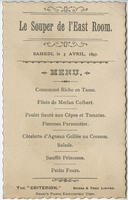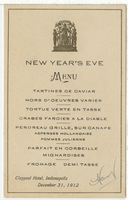Search the Special Collections and Archives Portal
Search Results
Helen Smith oral history interview
Identifier
Abstract
Oral history interview with Helen Smith conducted by Claytee D. White on February 20, 2007 for the Boyer Early Las Vegas Oral History Project. In this interview, Smith discusses her personal history and moving to Las Vegas, Nevada in 1956. She then talks about her employment at Southern Nevada Memorial Hospital and the change to University Medical Center (UMC). Smith recalls an air conditioning business she co-owned with her husband at the time, and the activities she did as a member of Daughters of the Nile, a women's community service organization. Lastly, she discusses education and the general changes in Las Vegas.
Archival Collection

men000016s001_The Criterion, menu
Date
Archival Collection
Description
Text

Claypool Hotel, New Year's Eve dinner menu, 1912
Date
Archival Collection
Description
Text
Esther Langston oral history interview
Identifier
Abstract
Oral history interview with Esther Langston conducted by Claytee D. White on February 22, 2005 for the UNLV @ 50 Oral History Project. In this interview, Langston provides an overview of her early life and career in social work. She describes how the women in her family are positive and empowering role models. Langston moves on to explain how she become a social worker over a period of many years. She states that a job experience that helped her gain the qualifications of a social worker was working as an office manager at the Nevada Test Site. She also mentions how she has had to work with conflicts such as racial inequalities.
Archival Collection
Willis Clark Evans oral history interview
Identifier
Abstract
Oral history interview with Willis Clark Evans conducted by Bernard Timberg on February 5, 1974 for the Ralph Roske Oral History Project on Early Las Vegas. In this interview, Evans discusses his father, Native American archaeologist Willis Lyman Evans, his mother, Jessie Dave Evans, his uncle, Henry "Hank" Dave as he recounts his upbringing and family history. He shares memories of family trips around the United States, hunting trips, learning traditional crafts from his father, finding artifacts, and visiting Richard "Chick" Perkins at the Lost City Museum. He also recounts stories about his mother and her Shoshone family, including stories about his uncle's experiences as a ranch worker in Northern Nevada.
Archival Collection
Jinetta Daniels oral history interview
Identifier
Abstract
Oral history interview with Jinetta Daniels conducted by Rani Dunn on November 30, 2014 for the African Americans in Las Vegas: a Collaborative Oral History Project. In this interview, Daniels talks about her upbringing in Mississippi and traveling to Las Vegas, Nevada by bus in 1962. She continues discussing her work as a maid at the Dunes Hotel, her membership in the Victory Baptist Church, and comments on various church and community leaders in the Westside. She also mentions her concerns about the closure of F Street in 2008 and her hopes for the revitalization of the Westside community.
Archival Collection
Robert B. Griffith oral history interview
Identifier
Abstract
Oral history interview with Robert B. Griffith conducted by Bernard Timberg on March 06, 1974 for the UNLV University Libraries Oral History Collection. In this interview, Griffith talks about living in Las Vegas, Nevada since the early 1900s. He describes the recreational activities he would participate in, the Huntridge Theater, desegregation, and the development of hotels and casinos on the Strip.
Archival Collection
John S. Park Roundtable Discussion #4: Community Change/Gentrification
Identifier
Abstract
Roundtable discussion with Michael Baker, Angela Kallus, Billy Logan, Jacqueline Maloy, Todd Jones, JoNell Thomas, Sarah Haggerty, Gregory S. Brown, and Dayvid Figler conducted by Claytee D. White on January 22, 2011 for the Voices of the Historic John S. Park Neighborhood Oral History Project. In this roundtable discussion, participants talk about their decision to move into the John S. Park neighborhood. The group describes the houses in the area during the early 2000s, changes in the house designs, and crimes in the area. Lastly, the participants talk about the gentrification of the area.
Archival Collection
Edyth Hess Hoban oral history interviews
Identifier
Abstract
Oral history interviews with Edyth Hess Hoban conducted by Jane E. Olive on March 11, 2000 and May 23, 2000 for the UNLV University Libraries Oral History Collection. In this interview, Hoban discusses her early life in Scotland, South Dakota. She remembers the 1918 Influenza pandemic, her early interest in music, and becoming the band leader for the all-women orchestra, The Sophisticates. Hoban talks about moving to Las Vegas, Nevada in 1942, competing and winning in golf tournaments, and changes in Las Vegas golf courses.
Archival Collection
Harriet Barlow oral history interview
Identifier
Abstract
Oral history interview with Harriet Barlow conducted by Elsha Harris-Tolanda on April 27, 2015 for the African Americans in Las Vegas: a Collaborative Oral History Project. In this interview, Barlow discusses her personal history and growing up in Robbins, Illinois. She talks about her education, discrimination in schools, and the process of school integration. Barlow then recalls her first impressions of Las Vegas, Nevada and her employment at the University of Nevada, Las Vegas. Lastly, Barlow describes going through graduate school as an African American and explains why conversations about race relations can be difficult.
Archival Collection
